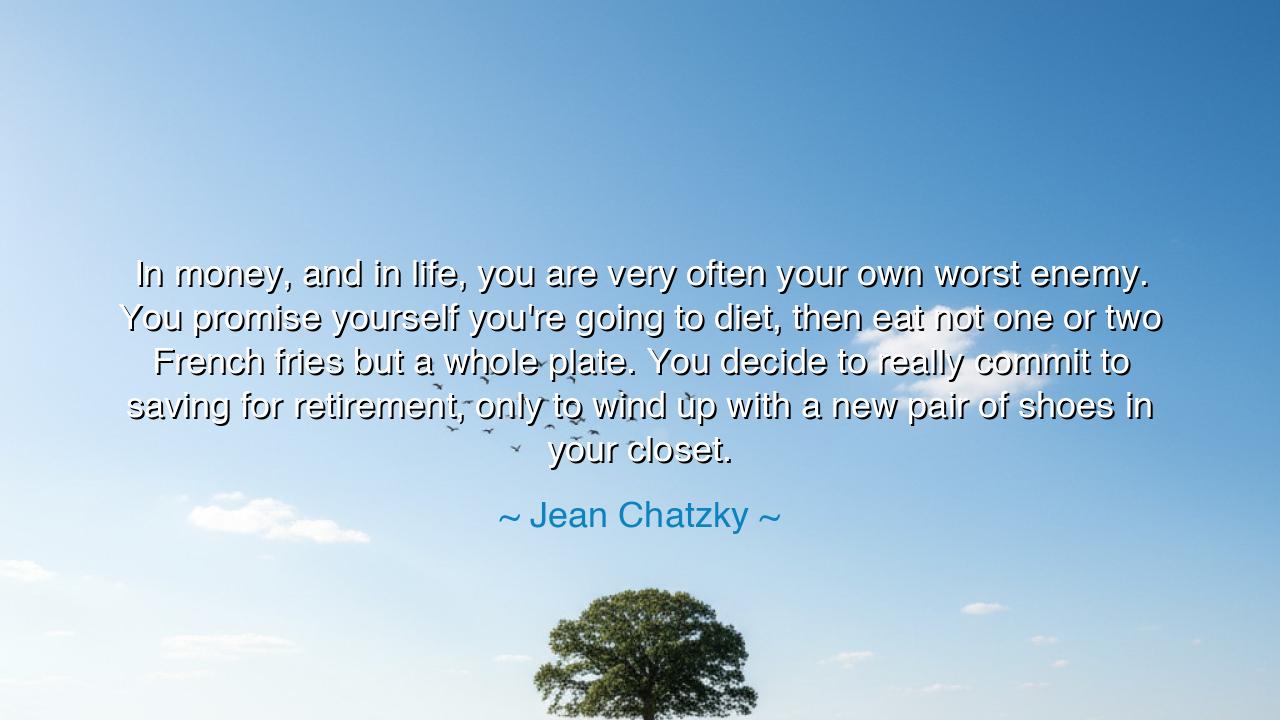
In money, and in life, you are very often your own worst enemy.
In money, and in life, you are very often your own worst enemy. You promise yourself you're going to diet, then eat not one or two French fries but a whole plate. You decide to really commit to saving for retirement, only to wind up with a new pair of shoes in your closet.






In the journey of life, we are often told to conquer the world, to rise above challenges, to master our desires and dreams. Yet, in the quiet recesses of our hearts, there lies an adversary far greater than any external foe—ourselves. Jean Chatzky reveals this truth with striking clarity, noting that in both the world of money and the world of life, we are often our own worst enemy. This enemy is not one that strikes with external force, but one that arises from within, from the promises we make and the desires we indulge. It is a force that lies hidden in the shadows of our aspirations, whispering temptation when we vow discipline, urging us to deviate from the path we set before us.
Ah, how easily we make promises! We vow to diet, to save for the future, to live better, only to find ourselves slipping into old patterns, succumbing to the fleeting pleasures that promise us comfort in the moment. Chatzky speaks of the plate of French fries, so innocently placed before us. What is it but a symbol of the many small indulgences that seem so harmless, yet together build a wall between us and our goals? We tell ourselves, "I will not have another," yet one becomes many, and the promise is forgotten in the heat of the moment. This is the struggle of the human soul: the conflict between the desires of the flesh and the wisdom of the mind.
Do you recall the tale of Achilles, that great hero of ancient myth, whose only weakness lay in his heel? So too do we find our weaknesses, our vulnerable spots, in the places where we have made promises to ourselves. In the promise to save, we may be lured by the siren call of something new, something shiny—like the new pair of shoes that finds its way into our closet. A single, fleeting indulgence can undermine our deepest intentions, for the desires of the moment often drown out the whisperings of reason. Chatzky reminds us that this struggle is not one of riches or of lacking—it is the internal battle we fight against ourselves, where the battlefields are our choices and our actions.
The ancient wisdom of Socrates tells us that “to know thyself is the beginning of wisdom.” We must understand the depths of our desires and the limits of our willpower, for in doing so, we will gain the strength to rise above the temptations that hold us back. The key is not to rid ourselves of all desire—no, that is folly—but to temper our desires with the wisdom of self-control. In this, we find true mastery. The ancient Greeks were not merely concerned with physical strength or courage in battle; they revered the mastery over oneself as the highest form of virtue. To know when to act and when to abstain, to understand when indulgence strengthens the spirit and when it weakens it—this is the path of wisdom.
Think also of the noble king Solomon, who, despite his wisdom, faced the same trials. In his wealth and grandeur, he too was tempted by indulgence—tempted to gather wealth beyond measure, to satisfy every whim of his heart, yet still he spoke of the fleeting nature of material riches. His proverbs remind us that the greatest treasure is not the accumulation of wealth or the indulgence of desire, but the wisdom to walk a balanced path, to take what is needed and to refrain from excess. Solomon knew that the pursuit of wealth for wealth’s sake leads only to emptiness. Instead, he spoke of the importance of saving, of planning for the future, of living wisely.
Thus, we are given the great lesson of self-discipline—to recognize that our greatest adversary often lies within. We must not wage war against our desires, but instead seek balance, moderation, and foresight. When you face the plate of French fries, remember the wisdom of restraint; when you are drawn to the new pair of shoes, pause and ask yourself, “Will this bring me closer to my goals, or farther away?” Each decision we make, however small, shapes the course of our lives. Chatzky’s warning is a call to awaken, to understand that the choices we make in the quiet moments of our day are the very choices that will determine the future we build.
Let us now take this wisdom and apply it to our own lives. Set clear intentions, and know that the path to success and fulfillment is not without its temptations. Acknowledge that your greatest enemy is not the world, but your own impulses. Master yourself, and you shall find that you are capable of achieving the things you once thought impossible. Begin with small victories—each time you make a choice that aligns with your greater vision, you strengthen the will, and the future becomes clearer, brighter. By mastering the inner battle, you will create a life of purpose, one not ruled by whims, but shaped by conscious, thoughtful action.






AAdministratorAdministrator
Welcome, honored guests. Please leave a comment, we will respond soon